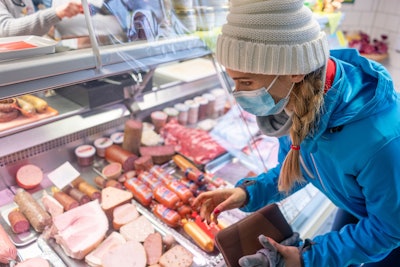
U.S. President Joe Biden and his administration say a lack of competition in the meat and poultry industry is playing a key role in the rising prices at the consumer level, and because of those beliefs, the administration is promising to take action by enforcing antitrust laws and boost competition.
The administration’s promised action was addressed on September 8, both in the form of a press release and a press conference in which U.S. Secretary of Agriculture Tom Vilsack and National Economic Council Brian Deese spoke.
In the press release issued by the White House, the administration acknowledged that some of the price increases have been driven by increased consumer demand, it also stated: “Just four large conglomerates control the majority of the market for each of these three products (beef, pork and poultry), and the data show that these companies have been raising prices while generating record profits during the pandemic. That’s why the Biden-Harris Administration is taking bold action to enforce the antitrust laws, boost competition in meat processing, and push back on pandemic profiteering that is hurting consumers, farmers and ranchers across the country.”
That action, according to the release, included:
- Addressing concerns of alleged illegal price fixing, enforcing antitrust laws and bringing more transparency to the meat processing industry. The administration pointed out that the U.S. Department of Agriculture (USDA) and U.S. Department of Justice is currently conducting an investigation to allegations of price fixing in the U.S. poultry industry. It also pointed out efforts to strengthen the Packers and Stockyards Act so processors cannot “use their market dominance to abuse farmers and ranchers.”
- Providing relief to small businesses and workers hurt by the COVID-19 pandemic and creating a more competitive supply chain. This includes pandemic assistance to small producers and processors.
- Expansion of USDA’s Emergency Assistance for Livestock, Honeybees and Farm-Raised Fish Program (ELAP) to include the cost of transporting feed, delivering much-needed relief to producers affected by the recent drought.
- Working with Congress to make cattle markets more transparent and fair.
Industry responds
Tyson Foods and the North American Meat Institute (NAMI) both issued statements responding to the administration’s allegations against the industry, with NAMI calling the government’s statements “inflammatory.”
“As with almost every industry, meat and poultry packers and processors of all sizes have been, and continue to be, affected by the global pandemic and the inflationary trends that challenge the U.S. economy,” said Mark Dopp, NAMI’s chief operating officer. “American consumers of most goods and services are seeing higher costs, largely due to a persistent and widespread labor shortage. The meat and poultry industry is no different. Issuing inflammatory statements that ignore the fundamentals of how supply and demand affects markets accomplishes nothing. Meat and poultry markets are competitive and dynamic with no one sector of the industry consistently dominating the market at the expense of another.”
Tyson Foods, in its statement, said the company “categorically rejects” the conclusions drawn by the Biden administration.
“It is inaccurate to suggest that consolidation in the meat processing industry is leading to higher prices for consumers. In fact, evidence of healthy competition can also be found by looking at historical outcomes. For example, we have seen a rise in availability and quality of beef, while the price has become more affordable over the past quarter-century: data shows that while the concentration of the industry has remained relatively constant for close to 30 years, quality has significantly improved,” the company stated.
Tyson also stated that weather conditions and staffing shortages have more to do with the current economics of the industry.
“Multiple, unprecedented market shocks, including a global pandemic and severe weather conditions, led to an unexpected and drastic drop in meat processors’ abilities to operate at full capacity. This led to an oversupply of live cattle and an undersupply of beef, while demand for beef products was at an all-time high. So, as a result, the price for cattle fell, while the price for beef rose. Today, prices paid to cattle producers are rising,” Tyson stated.
“Labor shortages – the inability of the industry to adequately staff its plants – has exacerbated the situation. Labor shortages are also affecting the nation’s pork and poultry supply.”
















